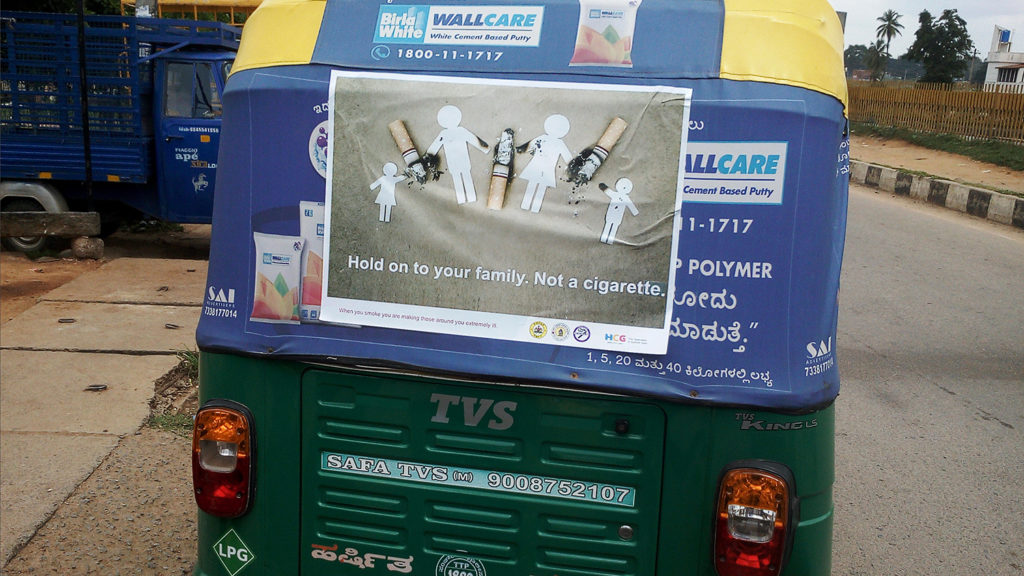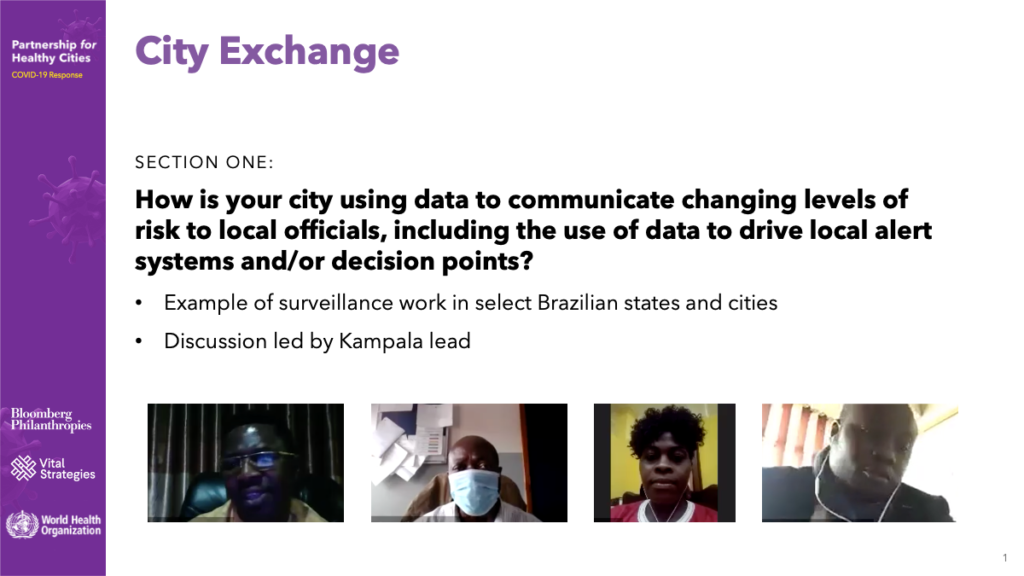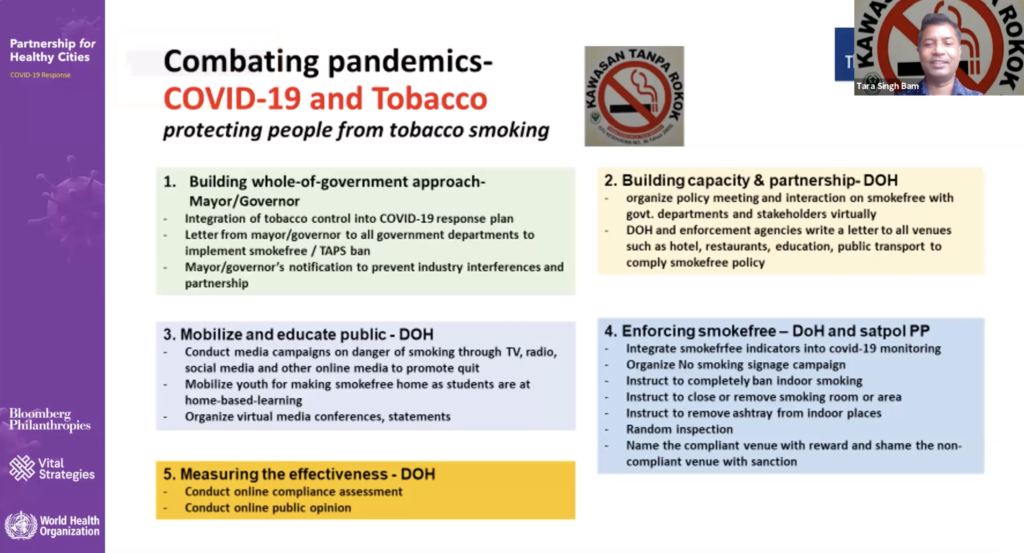New Partnership for Healthy Cities technical exchange series kicked off with focus on Africa and Asia
As the COVID-19 pandemic continues to test global health systems and leadership, people in cities are experiencing the brunt of the effects. Supporting the local response in cities—home to more than 50% of the world’s population—is critical for blunting the impact of the virus.
In response to this unprecedented crisis, the Partnership for Healthy Cities has expanded its technical scope to provide cities in its network with practical tools and resources to enhance local efforts. We’ve also built a virtual platform where COVID-19 city responders can share ideas and strategies with one another.
The COVID-19 PHC City Technical Exchange Series brings together small groups of cities in the network to share challenges and lessons learned in specific areas of the pandemic response. During this pandemic, peer-to-peer learning is one of the best tools we have, and the relationships forged through the Partnership since its inception in 2017 have proven more valuable than ever.

Two recent sessions focusing on the COVID-19 situation in cities in Africa and Asia confirmed that while no two urban areas are the same, they face many of the same challenges in responding to the pandemic—and benefit greatly from exchanges with their counterparts regionally and worldwide.
Strengthening Surveillance Systems and Data Use for Real Time Decision-Making in Africa
Building upon earlier experiences with Ebola and other communicable diseases, countries across Africa responded quickly to initial COVID-19 outbreaks by enacting public health and social measures—the most effective tools for combating a rapidly spreading infectious disease in the absence of effective treatments or vaccines. This gave the region’s cities an advantage in suppressing the virus, though population density, high rates of poverty and overwhelmed health care systems have tested the traditional public health response. More than 1 million cases of COVID-19 have been reported across Africa.
In mid-July, the COVID-19 PHC City Technical Exchange Series convened five cities in Africa to discuss their experiences developing and deploying urban COVID-19 surveillance systems. The exchange placed a special focus on the use of data to inform local decision-making, including data needed to clearly assess and communicate changing levels of risk and to drive recommendations for adjusting local public health and social measures.
Many national governments have responded by bolstering disease surveillance systems, and city leaders have followed suit. This kind of epidemiological evidenceand data plays a critical role in understanding the scope of COVID-19 spread among urban populations and guiding the implementation of lifesaving measures.

The virtual session opened with a presentation by Fatima Marinho, Senior Technical Officer with the Vital Strategies Civil Registration and Vital Statistics Improvement Program, on the experiences of several Brazilian states and cities in using syndromic and mortality surveillance to establish epidemic alert levels. Subsequent peer-to-peer discussion highlighted the creative ways in which cities across the continent are using data to address their unique challenges with COVID-19. From establishing a market rotation system in Kumasi, Ghana to coordinating diverse resources in Freetown, Sierra Leone, surveillance systems are helping urban leaders save lives.
In Kampala, Uganda, for example, a new surveillance dashboard, which takes into account community exposure, vulnerability and other factors, is helping to expedite the city’s response activities. Local assembly members in Accra, Ghana have used epidemiological data to identify cases in their community and help resolve issues of stigmatization. Representatives from Harare, Zimbabwe noted that the whole-of-society approach required by the local outbreak has benefited from a recent uptake of electronic health records systems.
Cities in Asia Discuss Tobacco Control Enforcement in the Context of COVID-19
As the original epicenter of COVID-19, the Asian region has made significant progress in containing the spread of the virus. Yet challenges remain and many cities are facing either an extended first wave or even a second wave of COVID-19. Like in other regions of the world, public resources have been largely diverted to epidemic response—with consequences for other critical public health challenges.
Last week, the COVID-19 PHC City Technical Exchange Series brought together four Partnership cities in Asia working toward becoming smoke-free: Bandung and Jakarta in Indonesia; Kuala Lumpur, Malaysia; and Yangon, Myanmar. The four cities shared strategies, lessons learned, challenges and opportunities for adapting tobacco control work to the special context created by the pandemic.
Dr. Tara Singh Bam, Deputy Regional Director (Asia Pacific) at The Union, opened the session by emphasizing that city leaders have options for continuing work on tobacco control during the pandemic, despite new restrictions on city resources, less availability of primary care and challenges of in-person enforcement of smoke-free laws. For instance, smoking regulations and cessation information can be integrated into COVID-19 strategies, and city governments can “name and shame” businesses violating smoke-free laws by writing letters or publishing information online.

Participants from all four cities reported temporary cutbacks of smoke-free enforcement during the crisis. Nonetheless, Jakarta issued a reminder in April that all government offices can take complaints about smoke-free law violations. And Kuala Lumpur has posted smoke-free billboards that focus on the harms of secondhand smoke within households, since so many residents are sequestered at home.
Tobacco industry efforts to take advantage of the pandemic to boost profits or spread misinformation have been widely reported. Dr. Jagdish Kaur, WHO Regional Advisor on Tobacco Control for the Southeast Asia region, noted that in Indonesia, there have been industry offers of ventilators and personal protective equipment. In the absence of national restrictions, she urged cities to be proactive in blocking such efforts.
The discussions coming out of these two sessions of the City Technical Exchange Series have made clear the power of reaching across national boundaries to bring together local epidemic response leads. As case counts of COVID-19 continue to rise across the globe, bold action by city leaders is needed to keep our urban populations safe. Peer-to-peer exchange is a proven first step.
About the Partnership for Healthy Cities:
The Partnership for Healthy Cities is a prestigious global network of cities committed to saving lives by preventing noncommunicable diseases (NCDs) and injuries. Supported by Bloomberg Philanthropies in partnership with WHO, as well as Vital Strategies, this initiative enables cities around the world to deliver a high-impact policy or programmatic intervention to reduce NCDs and injuries in their communities. For more information, visit: https://partnershipforhealthycities.bloomberg.org/
The Partnership for Healthy Cities COVID-19 Response is part of the $40 million Bloomberg Philanthropies COVID-19 Global Response Initiative. By collaborating with the WHO and Resolve to Save Lives, an initiative of Vital Strategies, the Partnership for Healthy Cities COVID-19 Response is working hand-in-hand with the world’s leading experts on epidemic prevention.